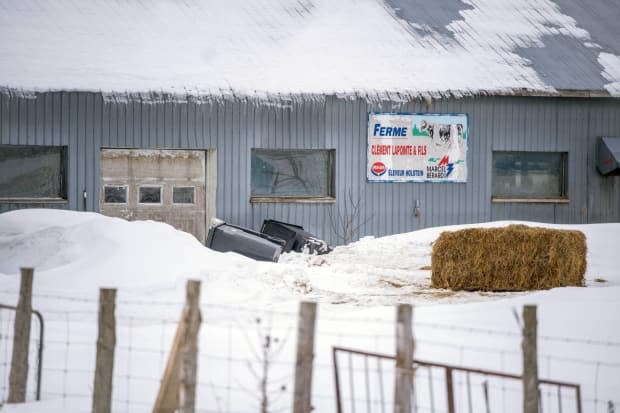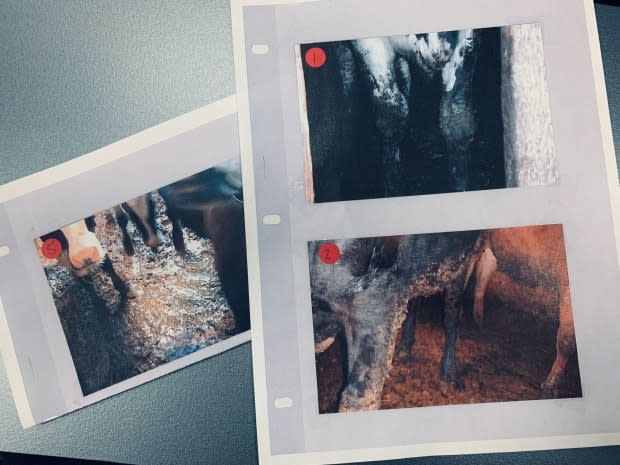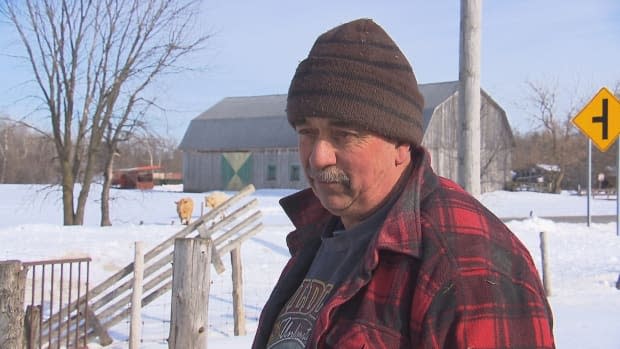Fugitive Quebec cows escaped farm fined thousands of dollars for neglect, documents reveal

A herd of cows made headlines across the world last year after they broke through fencing on a dairy farm in Saint-Sévère, Que., and proceeded to outwit and outrun capture attempts, all the while grazing contentedly and wreaking havoc on nearby farmers' fields for months.
The Holsteins were captured and finally returned to their homes months later but not before some showy attempts to wrangle them had failed.
But an access to information request by Radio-Canada reveals the farm the cows escaped from — Ferme Clément Lapointe et fils — had racked up fines for animal neglect over the past decade. As of March 1, 2023, the farm owed a balance of about $4,000.
Documents reveal inspectors had visited the farm 13 times over the past 10 years and issued 11 notices of non-compliance between 2010 and 2018.
In reports from MAPAC, Quebec's Agriculture Ministry, inspectors said several cows and calves were kept in unsanitary conditions years before their escape.
Inspectors outlined how they found mould in the calves' feeders and food and water and food of "questionable" or "insufficient quantity." Some cattle were reportedly thin, and a dead bird was found in an outdoor water trough.
"The calves have legs, flanks and bellies crusted with manure. The floor and walls are covered with brownish, solid and liquid feces. The owner of the animals does not ensure that the welfare of the animals is not compromised," read one of the reports.

No place to lie down and poor ventilation, reported inspectors
Émilie Pelletier, a veterinarian and counsellor for animal welfare at MAPAQ, says inspectors typically come to farms after receiving a complaint. She says the standards for care came into effect in 2015, with the Animal Welfare and Safety Act — requiring farms to be sanitary, clean and suitable.
Pelletier says when the situation warrants it, a violation report is written by the inspector and forwarded to the Ministry of Justice, which issues a statement of violation.
Among the 80 pages of documents obtained, the first notice to the farm was issued in 2010 in relation to unclean equipment and improperly stored medication. The cows also did not have traceable ear tags.
In March and May 2013, non-compliance notices were issued and two infractions were handed out.
Inspectors reported that in the small barn there were "several cattle crowded together … There is no ventilation and not enough light. There is an accumulation of manure and the animals have no place to lie down without being on top of one another."
Between 2013 and 2016, the Ministry of Justice issued five citations totalling over $5,000 to the farm.

Steve Adam, a dairy welfare consultant in Quebec, says it's generally not that hard to follow regulations.
"These are basic standards of care," said Adam. "Protecting them from the elements, providing water and food… That's the standard we have to provide to animals."
He adds that these types of situations are "pretty fixable."
Farm owner says he's operating in 'old-fashioned way'
Pierre Lapointe, who operated the farm with his father until 2021, admits the place has received repeated visits from MAPAQ, but minimizes the infractions committed.
"They have to find something when they come," said Lapointe, when Radio-Canada visited his farm in late February. "We will do what they ask."
"It's almost impossible that [the MAPAQ inspectors] won't find anything."
Lapointe says he may have been overwhelmed by the ever-changing regulations, most recently when his cows went off the farm and he acknowledged his farm might be "out of date" when it comes to current norms and practices.
"Maybe we're still operating in the old-fashioned way, but I know that the animals are fine outside," said Lapointe.
He said he has recently started a process to bring his facilities up to standard.

Regulations can be 'heavy to bear'
The local farmers' union, UPA de la Mauricie, which was very involved in the 40-day operation to catch the animals in the wild, said it's less concerned about the costs the cows ran up and more concerned about the mental health of its members.
Marco Marcouiller, the regional UPA president and a pork producer, says that standards are changing very quickly and that Quebec is one of the most regulated provinces in the country.
"Whether it's MAPAQ, animal welfare or the environment, everything is really regulated," said Marcouiller.

"Yes, it's good … but there's another side, there's an overload at the producer level and that's what's starting to be a bit heavy to bear."
He said instead of talking about "cows on the run," there should be a discussion about the psychological distress put on producers.
"[The owner of the cows] was overwhelmed by all this, but the main thing is that the operation is over," said Marcouiller.


